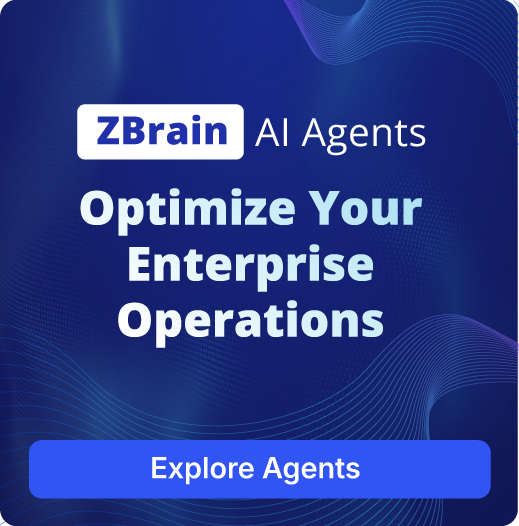Generative AI for customer success: Development, integration, use cases and future outlook

Listen to the article
As competition intensifies across industries, providing exceptional customer experiences (CX) has shifted from being a competitive advantage to an essential requirement for business survival. The stakes are high. According to a Zendesk report, over half of customers will choose a competitor after just one negative experience. This means that even one misstep can severely affect your bottom line.
To succeed, companies need innovative solutions to anticipate customer needs, offer personalized support, and build long-term loyalty. That’s where generative AI comes in. This technology is transforming how businesses interact with their customers—from marketing to sales to support.
In this article, we’ll look at the role of generative AI for customer success, the benefits it brings, and how businesses can integrate it into their systems for the best results. You’ll also get a glimpse into the future of this technology and its potential for driving loyalty and growth.
- What is generative AI?
- Generative AI for customer success
- The different approaches to integrating generative AI into customer success systems
- Why ZBrain is the ideal platform for customer success
- Key use cases of generative AI for customer success
- Measuring the ROI of generative AI in customer success
- Challenges and considerations in adopting generative AI for customer success
- The future of generative AI for customer success
- Transforming customer success with ZBrain: A full-stack agentic AI orchestration platform
What is generative AI?
Generative AI is a branch of AI that can create new content, such as images, text, music, code, or even videos when prompted by users. It works by learning patterns and structures from vast datasets and then using that knowledge to generate new, original content. Unlike traditional AI, which typically analyzes data to make predictions or decisions, generative AI can produce original outputs that resemble human-created content. This is achieved through models like GPT (for text) or GANs (Generative Adversarial Networks) for images.
For example, a generative AI model trained on a large corpus of text can write essays, generate articles, or even engage in conversations. Similarly, a generative AI trained on a dataset of images can create new, realistic-looking images or art. These models are powerful tools for tasks that involve creativity and content generation. Popular examples of generative AI models include GPT-4 for text generation and DALL-E 2 for image creation.
Generative AI for customer success
Generative AI is a game-changer for companies seeking customer growth. Today, companies across industries are using generative AI to go beyond simple automation, achieving significant gains in productivity and customer relevance. The potential is immense. According to a study, companies that implement generative AI in customer-related initiatives can anticipate achieving 25% higher revenue over five years compared to those that concentrate solely on productivity.
CX leaders believe generative AI can strike a crucial balance: delivering both efficiency and empathy. They see the potential for GenAI to create interpersonal and engaging interactions, addressing a common concern that AI can be impersonal and lacking in genuine human connection.
This shift in perception is reflected in the rapidly evolving landscape of generative AI for customer success. We’re seeing AI-powered tools that streamline operations, personalize customer interactions, and even anticipate customer needs. Imagine AI-driven chatbots offering personalized product recommendations or AI-powered customer service systems automatically resolving issues and providing proactive support. These are not just futuristic fantasies but real-world applications that are transforming customer success strategies.
Streamline your operational workflows with ZBrain AI agents designed to address enterprise challenges.
The different approaches to integrating generative AI into customer success systems
As generative AI rapidly transforms the business landscape, integrating it into customer success systems is becoming a crucial step for companies seeking sustainable growth. Here are three distinct approaches, each offering unique benefits:
- Custom AI stacks: This approach involves building a custom AI solution from scratch, carefully selecting and integrating individual components like LLMs, data pipelines, and other tools to build the custom software. For instance, building a custom AI model from scratch using open-source frameworks like TensorFlow or PyTorch.
Benefits:
- Ultimate customization: Tailor the AI solution to your exact needs and specific business processes.
- Maximum control: Complete ownership over the AI stack, allowing for fine-tuning and optimization.
- Potential for innovation: Experiment with cutting-edge AI technologies and push the boundaries of what’s possible.
- AI point solutions: This approach involves integrating pre-built AI tools/solutions designed for specific tasks within customer success, such as chatbot automation, content generation, or sentiment analysis.
Benefits:
- Faster deployment: Easy integration with ready-to-use, pre-configured solutions.
- Cost-effective: Often more affordable than custom stacks, especially for smaller businesses.
- Focused expertise: Benefit from specialized AI tools designed for specific customer success challenges.
- Fully-integrated platforms: This approach utilizes comprehensive platforms like ZBrain Builder that offer a unified suite of tools for building and deploying generative AI solutions. These platforms facilitate data ingestion, knowledge management, model selection, application development, and continuous improvement.
Benefits:
- Seamless integration: Connect various AI components and tools seamlessly, creating a cohesive system.
- Simplified development: Develop and deploy AI applications faster with pre-built tools and a user-friendly interface.
- End-to-end solutions: Handle the entire AI lifecycle from data collection to app deployment and maintenance.
- Scalability and flexibility: Adapt to changing needs and easily scale AI solutions as your business grows.
By choosing the right approach based on your organization’s specific needs, you can effectively leverage generative AI to improve customer satisfaction, drive revenue, and gain a competitive edge.
Why ZBrain is the ideal platform for customer success
ZBrain, with its AI capabilities, helps organizations optimize customer success processes by automating engagement strategies, enhancing customer insights, and ensuring proactive support. It provides a range of features designed to improve retention, satisfaction, and overall customer experience.
-
AI readiness assessment: ZBrain’s AI readiness assessment framework, ZBrain XPLR, evaluates an organization’s preparedness for AI adoption in customer success. It provides actionable insights to identify gaps, enhance engagement strategies, and ensure a seamless AI implementation.
-
Low-code development: ZBrain’s low-code platform, ZBrain Builder, simplifies the creation of custom AI solutions tailored to customer success operations, enabling automation of account health monitoring, personalized recommendations, and proactive issue resolution.
-
Proprietary data utilization: The platform enables organizations to leverage proprietary customer data effectively, ensuring AI-driven insights are aligned with specific customer success goals, such as churn prediction, upsell opportunities, and satisfaction tracking.
-
Enterprise-ready: ZBrain Builder is designed for enterprise-scale customer success operations, offering security, scalability, and seamless integration with CRM systems, customer support platforms, and feedback management tools.
-
End-to-end support: ZBrain Builder supports the full customer success lifecycle, from onboarding and engagement tracking to renewal management and customer advocacy, ensuring continuous optimization and strategic decision-making.
-
Flexible data ingestion: ZBrain integrates data from multiple sources, including CRM records, support interactions, and customer feedback, allowing AI-driven analysis for sentiment detection, escalation prediction, and engagement recommendations.
-
Intelligent agent creation: AI agents built on ZBrain Builder assist in automating key customer success tasks such as personalized follow-ups, proactive issue resolution, and account health assessments, reducing manual effort and improving customer relationships.
These capabilities position ZBrain as a powerful tool for customer success teams, enabling organizations to deliver proactive, data-driven engagement, enhance retention strategies, and maximize customer lifetime value.
Key use cases of generative AI for customer success
Generative AI is a powerful tool for improving customer success, offering a range of applications that can transform the customer journey. By leveraging AI-powered capabilities, businesses can personalize interactions, anticipate needs, and optimize operations, ultimately driving customer satisfaction and loyalty. Let’s explore some key use cases for generative AI in customer success, showcasing how ZBrain empowers businesses to implement these solutions effectively:
|
Use case |
Description |
How ZBrain helps |
|
Personalized onboarding |
Providing tailored onboarding experiences that guide new customers through product features, best practices, and relevant resources. |
ZBrain solutions analyze customer profiles, goals, and usage patterns to create onboarding guides tailored to individual needs and business objectives. |
|
Service inquiry follow-up |
Enhancing customer engagement by sending customized follow-up messages tailored to specific service inquiries, demonstrating prioritization of customer needs.
|
ZBrain’s service inquiry follow-up agent can tailor follow-up messages based on the nature of each inquiry, creating a personalized experience. By addressing the specifics of their original request, it can help support teams foster better relationships and improve customer satisfaction through attentive follow-ups. |
|
Timely complaint resolution management |
Ensuring prompt follow-up on customer complaints to enhance service quality and customer satisfaction. |
ZBrain’s complaint resolution alert agent monitors unresolved complaints and alerts the support team when issues exceed resolution timelines, enabling timely follow-ups and enhancing customer satisfaction. Also, the ticket closure notification agent notifies customers when their support tickets are resolved, enhancing communication and ensuring personalized updates. |
|
Timely ticket escalation management |
Prompt escalation of high-priority customer service issues by monitoring ticket status and notifying relevant teams of overdue tickets. |
ZBrain’s ticket escalation alert agent provides real-time alerts for overdue tickets, ensuring that high-priority issues are promptly escalated and addressed. This proactive approach can potentially reduce resolution times and boost customer satisfaction. |
|
Personalized product recommendations |
Recommending relevant products and services based on individual customer behavior and preferences. |
ZBrain leverages customer data and product information to create highly targeted and personalized product recommendations. ZBrain solutions can be integrated into various channels, such as website, email, and mobile apps. |
|
Response suggestion |
Providing automated response suggestions for common customer issues to enhance response efficiency and accuracy. |
ZBrain’s response suggestion agent analyzes common customer inquiries and generates contextually relevant response suggestions, empowering customer support teams to provide faster and more accurate solutions. |
|
Content generation and personalization |
Creating engaging and relevant content tailored to specific customer segments or individual preferences. |
ZBrain can be used to generate personalized email campaigns, blog articles, social media posts, and even product descriptions, all adapted to the interests and needs of individual customers. Its email campaign personalization agent creates customized email content for campaign launches to boost engagement and conversions. |
|
AI-powered sentiment analysis |
Analysis of customer sentiment and feedback to improve product development and customer experiences. |
ZBrain Builder’s advanced language processing capabilities can analyze customer feedback from emails, surveys, and social media to gauge sentiment. Its customer feedback sentiment analysis agent analyzes feedback across multiple channels, helping enhance products and customer experiences. Also, its social media sentiment analysis agent can check competitor mentions on social media to gauge public sentiment, driving insights into marketing strategies and helping businesses address concerns and improve products proactively. |
|
Follow-up reminder |
Automatically sending timely reminders for pending tickets and alerts for reopened tickets, ensuring prompt follow-up and resolutions by support agents.
|
ZBrain’s follow-up reminder agent automates reminders for both customers and support agents regarding pending and reopened tickets, enhancing response times and minimizing forgotten issues. Additionally, its ticket reopen alert agent notifies teams about reopened tickets, ensuring timely follow-ups that enhance customer satisfaction and reduce issue escalation. |
|
Knowledge base automation |
Creating and maintaining an up-to-date, comprehensive knowledge base that answers customer questions and provides self-service solutions. |
ZBrain can automate the creation and updating of knowledge base articles, ensuring accurate and relevant information is available to customers. Its knowledge base article generator agent generates structured, searchable articles based on resolved tickets, providing up-to-date documentation for reference. |
|
Inquiry routing agent |
Automatically routing customer inquiries to the appropriate support agent or department based on the content and categorization of the inquiry. |
ZBrain’s inquiry routing agent can accurately categorize inquiries, ensuring they reach the right team or individual for faster resolution. The agent can potentially optimize resource allocation and minimize delays, enhancing customer satisfaction and overall productivity. |
|
Customer engagement & retention |
Building lasting relationships through personalized communication and relevant offers. |
ZBrain solutions can analyze customer data to personalize communication, recommend relevant content, and tailor loyalty programs and promotions. Its account inactivity alert agent monitors inactive customer accounts, sending alerts to encourage re-engagement or subscription renewal. |
|
Customer service enhancement |
Automating the collection of customer feedback and monitoring satisfaction scores to improve service quality and drive customer service enhancements. |
ZBrain’s customer satisfaction survey agent can automate the distribution of surveys immediately following customer interactions, ensuring timely feedback collection. This helps quickly assess service quality and identify areas for improvement. Also, the CSAT decline alert agent can monitor customer satisfaction (CSAT) scores and alerts teams to any declines, enabling timely actions to address issues. |
|
Customer success management |
Optimizing the customer journey and proactively addressing potential issues.
|
ZBrain can analyze customer data to identify potential issues, automate routine tasks, and guide customers through personalized journeys, leading to higher satisfaction and loyalty. |
|
Feedback analysis and action |
Analyzing and categorizing customer feedback to identify key trends and drive continuous improvement.
|
ZBrain’s feedback summarization agent can classify customer feedback into key trends, recurring issues, and areas for improvement. Also, its categorization agent can organize feedback into predefined groups, streamlining analysis for faster insights and response times. By doing so, ZBrain empowers organizations to uncover crucial patterns, make data-driven decisions, proactively address issues, and allocate resources. |
By leveraging ZBrain’s capabilities, businesses can unlock the true potential of generative AI in customer success, driving stronger customer relationships, increased loyalty, and, ultimately, higher revenue.
Measuring the ROI of generative AI in customer success
Calculating the ROI of generative AI in customer success involves a multi-faceted approach, considering both tangible financial gains and qualitative improvements in customer satisfaction and operational efficiency. This involves comparing the initial and ongoing costs of implementing AI solutions against the benefits realized.
Some examples of ROI from ZBrain implementations are:
Reduced operational costs
- Use case: Automated customer support and knowledge base management.
- ROI metrics: Reduced support ticket volume, less time spent resolving inquiries and reduced reliance on human agents.
- Example: ZBrain’s AI chatbot can handle common customer queries, allowing customer support personnels to focus on issues that need human attention and helping to lower overall support costs.
Improved customer satisfaction
- Use case: Personalized product recommendations, proactive issue resolution, and tailored customer communication.
- ROI metrics: Increased customer satisfaction scores, higher customer retention rates and increased brand loyalty.
- Example: ZBrain can analyze customer behavior and preferences to deliver personalized product recommendations, leading to higher satisfaction and a reduced likelihood of customer churn.
Enhanced efficiency and productivity
- Use case: Automated content generation, campaign personalization, and workflow optimization.
- ROI metrics: Reduced time spent on content creation, increased efficiency of marketing campaigns, and improved customer onboarding processes.
- Example: ZBrain can automate the creation of personalized marketing emails, freeing up marketing teams to focus on strategy and creative development.
By carefully tracking and measuring these tangible and intangible benefits, businesses can quantify the significant impact of generative AI solutions like ZBrain on their customer success initiatives and demonstrate a clear ROI.
Streamline your operational workflows with ZBrain AI agents designed to address enterprise challenges.
Challenges and considerations in adopting generative AI for customer success
While generative AI holds immense promise for transforming customer success, adopting it effectively requires careful consideration and strategic planning. Here are some key challenges and how ZBrain addresses them:
Challenges
- Data quality and bias: Ensuring high-quality, accurate, and unbiased data is crucial for AI model accuracy and customer trust. Low-quality data can result in incorrect outputs, biased recommendations, and misleading insights.
- AI explainability and transparency: Generative AI models can be intricate, which can make it difficult to grasp how they arrive at their decisions. This complexity often creates trust issues for users.
- Human-AI collaboration: Effective implementation requires integrating AI seamlessly with human expertise, ensuring a collaborative approach.
- Ethical considerations: AI models can perpetuate existing biases present in training data, leading to unfair treatment of customers.
- Integration and scalability: It is crucial to seamlessly integrate generative AI with existing systems and ensure it can scale with a growing customer base.
- Continuous improvement: Generative AI models are not static and require continuous monitoring, evaluation, and refinement to maintain accuracy and improve performance.
Considerations
- ZBrain offers robust data ingestion and processing capabilities. It provides tools for data cleansing, validation, and enrichment, ensuring a reliable and accurate foundation for AI models. Additionally, ZBrain’s emphasis on data privacy and security ensures responsible handling of customer information.
- ZBrain provides features that enhance explainability and transparency. It shows which dataset the information comes from, helping users understand the logic behind recommendations and responses. This transparency fosters trust and accountability, empowering businesses to explain AI outputs to customers effectively.
- ZBrain is designed to facilitate human-AI collaboration. Its user-friendly interface allows for easy integration of AI-powered tools into existing workflows. Additionally, ZBrain provides mechanisms for human feedback and correction, allowing for continuous improvement and refinement of AI outputs.
- ZBrain is designed for seamless integration with various systems and platforms, simplifying implementation and minimizing disruption to existing workflows. ZBrain Builder is scalable, ensuring that generative AI solutions can handle increased workloads and manage growing customer demands.
- ZBrain provides tools for continuous monitoring and evaluation of AI models. Its platform incorporates reinforcement learning from human feedback mechanisms for users to provide insights and guide model improvement. This iterative approach ensures that AI models evolve and adapt to changing needs, delivering consistent and reliable results.
By addressing these challenges effectively, ZBrain empowers businesses to leverage generative AI responsibly and strategically for customer success. Its comprehensive features and commitment to ethical AI development make it a powerful platform for driving positive customer experiences.
The future of generative AI for customer success
The future of customer success is inextricably linked to the rapid evolution of generative AI. According to the Zendesk CX trends report, in just three years, the customer experience and the organizations dedicated to delivering it will change in ways we could not have imagined just ten years ago. By 2027, AI’s transformative effects will be felt widely. Human agents, admins, and their leaders will all work much differently than before, with roles and responsibilities shifting greatly. Here’s a glimpse into this exciting future of generative AI for customer success:
Hyper-personalized experiences: Generative AI will enable companies to tailor every customer touchpoint, from marketing campaigns and product recommendations to personalized onboarding and support interactions. AI will analyze large amounts of data, including customer behavior, preferences, and even emotions, to create truly unique and engaging experiences.
Proactive support and problem-solving: The lines between support and proactive guidance will blur. AI will anticipate customer needs and proactively offer solutions, preventing issues before they arise. This will transform customer service into a proactive, preventative force, ensuring a seamless and effortless journey.
Predictive customer journey optimization: Generative AI will analyze customer data to anticipate future requirements and behaviors, helping companies personalize their offerings and create more meaningful interactions. This will empower businesses to anticipate customer desires and provide tailored solutions, creating a truly anticipatory customer experience.
Augmented human intelligence: Generative AI will augment, not replace, human customer success teams. AI will handle repetitive tasks, freeing up valuable time for employees to focus on building deeper relationships and providing strategic guidance. This will create a more collaborative and empowered customer success ecosystem.
Ethical considerations: As generative AI becomes more sophisticated, ethical considerations will come to the forefront. Companies must prioritize responsible AI practices, ensuring fairness, transparency, and data privacy in every application.
The future of customer success lies in embracing the power of generative AI. Companies that invest in this technology and prioritize ethical practices will be best positioned to deliver personalized, proactive, and predictive experiences that create loyal customers and drive sustainable growth.
Transforming customer success with ZBrain: A full-stack agentic AI orchestration platform
ZBrain, a comprehensive generative AI platform, is transforming the way businesses approach customer success. ZBrain Builder is a low-code, enterprise-grade platform for agentic AI orchestration. It allows businesses to utilize various LLMs (e.g., GPT-4, Claude, Llama-3, Gemini) to create secure, customized genAI solutions or AI agents that optimize operations, automate workflows, and generate actionable insights. ZBrain XPLR helps enterprises assess AI readiness, uncover high-impact opportunities, and strategically align AI initiatives across business functions. It offers a structured framework to prioritize AI investments, ensuring resources focus on initiatives with the greatest potential impact. Designed to enhance operational efficiency and integrate seamlessly with existing systems, ZBrain Builder enables the development of AI-driven solutions that automate customer success management. Here’s a closer look at how ZBrain can improve processes and unlock the full potential of customer success:
ZBrain’s key features driving enhanced customer success
As a agentic AI orchestration platform, ZBrain is ideally positioned to enhance customer success. Here’s how each ZBrain feature delivers significant value to customer-focused businesses:
- Seamless integration into workflows: ZBrain connects effortlessly with existing tools like Slack, Microsoft Teams, and other platforms using APIs, allowing businesses to optimize workflows, improve team collaboration, and streamline communication across departments. This integration ensures smoother operations, quicker response times, and enhanced customer service by unifying their tech ecosystem.
- Low-code interface: ZBrain’s low-code interface, Flow, allows businesses to easily design workflows for their customer success processes. These workflows outline how each step in a complex use case will be managed, creating a complete solution. This simplifies the handling of intricate cases, providing businesses with greater flexibility and speed.
- Continuous improvement: ZBrain’s ability to refine AI models through human feedback ensures that its applications become more precise and effective over time. For customer success teams, this results in a better understanding of customer needs, more efficient task automation, and improved decision-making based on real-world data. This results in happier customers and improved overall performance.
- Multi-source data integration: ZBrain integrates data from various sources—databases, cloud services, and APIs—ensuring no crucial information is missed. Businesses can access customer preferences, purchase history, and engagement data across different systems, enabling deeper personalization and informed decision-making. This data integration also ensures secure and efficient operations.
- Advanced knowledge base: ZBrain’s advanced knowledge base stores and retrieves structured data, empowering businesses to create solutions based on extensive customer information. This helps deliver faster, more accurate services like personalized recommendations or real-time problem-solving, ultimately boosting customer satisfaction and loyalty.
- AI agents: ZBrain’s AI agents are autonomous digital assistants designed to execute and manage specific use cases. These agents can be customized with specific instructions to guide their behavior, decision-making, and actions. Businesses can equip the agents with various tools to perform specialized tasks and access external resources, expanding their functionality. These AI agents help automate customer service processes, improve response times, and boost overall customer success.
These features of ZBrain can help businesses streamline their operations, improve customer experiences, and make well-informed decisions, all while minimizing the need for extensive technical expertise.
Benefits for customer success
ZBrain provides several key benefits for teams involved in ensuring customer success:
- Custom solutions: ZBrain Builder can enable businesses to develop solutions tailored to their specific requirements, helping them effectively tackle unique customer success challenges.
- Automating complex workflows: ZBrain solutions can streamline intricate processes, from onboarding to customer support, engagement, and retention strategies, reducing human effort and allowing teams to focus on improving customer experiences.
- Better decision-making: ZBrain solutions can enable businesses to analyze large data sets quickly, enabling faster and more informed decisions related to operations, marketing, and customer service.
- Personalized experiences at scale: The platform can help businesses provide personalized services, like customized onboarding experiences and tailored recommendations, boosting customer satisfaction and fostering loyalty.
- Boosted efficiency: Automating repetitive tasks and optimizing workflows lead to quicker responses, improved operational efficiency, and reduced costs, ensuring smooth team operations.
- Scalability: ZBrain Builder can help businesses develop solutions that grow with their evolving needs, making it easier to scale operations while keeping service quality and efficiency high.
By automating routine tasks, personalizing customer experiences, and improving operational efficiency, ZBrain solutions can enable customer success teams to focus on delivering excellent service and fostering long-term customer relationships. As the industry shifts, ZBrain stands as a vital tool for enterprises looking to leverage AI and redefine service quality in the digital age.
Endnote
Incorporating generative AI in customer success workflows facilitates automated support, intelligent decision-making, and hyper-personalized marketing campaigns. Generative AI is set to transform every aspect of customer engagement, making interactions more efficient, tailored, and responsive to individual needs. Its ability to analyze large amounts of data and create tailored responses in real-time will reshape the customer journey, creating a future where businesses anticipate needs, solve problems proactively, and empower customers like never before.
Businesses can benefit from full-stack generative AI platforms like ZBrain. The platform can enable the creation of AI-powered recommendation engines that offer personalized suggestions, AI-driven chatbots that handle complex customer inquiries, and automated systems that streamline workflows and improve response times. These tools can enhance customer support, streamline workflows, and improve client satisfaction. From personalized onboarding experiences to automated problem resolution, generative AI can transform customer interactions across industries, making processes more efficient and customer-focused.
Ready to tap into the full potential of generative AI for customer success strategy? Start building your own AI-based customer support solutions today with ZBrain!
Listen to the article
Author’s Bio

An early adopter of emerging technologies, Akash leads innovation in AI, driving transformative solutions that enhance business operations. With his entrepreneurial spirit, technical acumen and passion for AI, Akash continues to explore new horizons, empowering businesses with solutions that enable seamless automation, intelligent decision-making, and next-generation digital experiences.
Table of content
- What is generative AI?
- Generative AI for customer success
- The different approaches to integrating generative AI into customer success systems
- Why ZBrain is the ideal platform for customer success
- Key use cases of generative AI for customer success
- Measuring the ROI of generative AI in customer success
- Challenges and considerations in adopting generative AI for customer success
- The future of generative AI for customer success
- Transforming customer success with ZBrain: A full-stack agentic AI orchestration platform
Frequently Asked Questions
What is ZBrain, and how can it optimize customer success operations with generative AI?
ZBrain is an end-to-end agentic AI orchestration platform that enables businesses to integrate AI into their customer success operations seamlessly. By leveraging ZBrain, organizations can enhance customer interactions, streamline support processes, and drive proactive engagement, ultimately fostering deeper customer relationships and satisfaction.
Here’s how ZBrain enhances customer success operations:
AI readiness assessment with ZBrain XPLR: ZBrain XPLR provides a detailed AI readiness assessment, enabling customer success teams to evaluate current processes and identify areas for AI-driven optimization. This strategic approach ensures effective AI adoption, improving customer engagement and retention.
Seamless data ingestion and integration: ZBrain Builder integrates with customer relationship management (CRM) systems, support platforms, and communication tools to unify customer data from multiple sources. This integration facilitates real-time analytics, empowering teams to make data-driven decisions that enhance customer satisfaction.
Low-code development environment: ZBrain Builder’s intuitive, low-code interface allows customer success professionals to create and deploy gen AI-driven solutions with minimal technical expertise. This capability accelerates the automation of key processes, such as customer onboarding, support ticket management, and feedback analysis.
Cloud and model flexibility: Supporting advanced AI models like GPT-4 and LLaMA, ZBrain integrates with cloud platforms such as AWS, Azure, and GCP. This flexibility enables customer success teams to deploy scalable AI solutions tailored to their organization’s unique needs.
Enhanced compliance and governance: ZBrain’s AI-driven analytics assist teams in ensuring compliance with data protection regulations and internal policies. By continuously monitoring customer interactions, ZBrain identifies potential risks related to data privacy and service quality, supporting adherence to compliance standards.
By combining powerful AI capabilities with seamless data integration, ZBrain enables organizations to optimize customer success strategies, improve operational efficiency, and create a more agile, future-ready customer success function.
How does ZBrain ensure the security and privacy of sensitive data in customer success operations?
ZBrain is designed to focus on data privacy and security, ensuring that sensitive customer information—such as personal details, interaction histories, and support records—is protected throughout all customer success operations. Here’s how ZBrain safeguards this data:
Private cloud deployments: ZBrain offers flexible deployment options, including private self-hosted cloud infrastructures, allowing organizations to keep sensitive customer data in secure environments. This approach ensures data privacy and security while unlocking the full potential of AI models.
Robust security features:
-
Access controls: ZBrain incorporates role-based permissions, ensuring only authorized users can access sensitive data. This robust protection of business-critical information upholds compliance with regulatory requirements.
-
Anonymization and compliance monitoring: ZBrain’s risk governance feature enhances data safety by identifying and removing risky information, replacing it with synthetic data to minimize potential risks, including financial, privacy, intellectual property, and confidential information risks.
Compliance and governance: ZBrain complies with global security standards ISO 27001:2022 and SOC 2 Type II, ensuring adherence to privacy laws and robust data protection measures. This compliance ensures that customer data is managed with confidentiality, integrity, and accountability.
By integrating these security and compliance measures, ZBrain enables customer success teams to leverage AI-driven strategies while ensuring that customer data remains protected and regulatory requirements are met.
Can ZBrain AI agents be integrated with existing customer success systems?
Yes, ZBrain AI agents are designed to integrate seamlessly with existing customer success systems, including customer relationship management (CRM) platforms, support ticketing systems, and communication tools. This integration enables organizations to enhance their customer success strategies by leveraging AI-driven insights and automation without overhauling their current infrastructure.
Key integration benefits:
-
Leverage existing infrastructure: ZBrain’s design ensures seamless integration with various systems and platforms, simplifying implementation and minimizing disruption to existing workflows.
-
Enrich data and workflows: By connecting ZBrain AI agents with existing tools, organizations can automate processes such as customer onboarding, support ticket management, and feedback analysis, leading to more efficient operations and improved customer satisfaction.
-
Drive AI-driven insights: ZBrain’s gen AI capabilities enable the analysis of customer data to identify potential issues, and recommend proactive strategies, thereby enhancing decision-making and fostering stronger customer relationships.
By enabling seamless integration, ZBrain ensures that customer success teams can modernize their operations without disrupting existing ecosystems, leading to improved efficiency, data-driven decision-making, and enhanced customer experiences.
What AI agents can be built on ZBrain for customer success operations?
ZBrain enables organizations to develop generative AI powered agents tailored to enhance customer success operations. By leveraging ZBrain’s capabilities, businesses can create AI agents that streamline processes, personalize customer interactions, and provide actionable insights, all while integrating seamlessly with existing customer success systems.
Key AI agents that can be built on ZBrain:
-
Persona modeling agent: Synthesizes customer data into detailed personas, aiding in customizing service strategies.
-
Dynamic persona updates agent: Updates and refines customer personas based on new data to ensure accuracy and relevance.
-
AI-driven service customization agent: Personalizes customer service approaches based on persona insights.
-
Customer sentiment analysis agent: Analyzes customer feedback to assess satisfaction levels and identify areas for improvement.
-
Customer journey mapping agent: Visualizes customer interactions across touchpoints to optimize engagement strategies.
-
Churn Management: By examining customer interactions and behaviors, ZBrain’s AI agents can identify patterns that may indicate potential customer attrition. This enables businesses to implement targeted retention strategies to maintain customer loyalty.
-
Competitive intelligence agent: ZBrain’s AI agents can aggregate and analyze information from various sources, such as market trends and competitor activities. This gives businesses actionable insights to inform strategic decisions and maintain a competitive edge.
By leveraging ZBrain’s AI-driven automation and analytics, organizations can enhance customer satisfaction, improve retention rates, and build more responsive, data-driven customer success strategies.
How does ZBrain cater to diverse customer success operations across business functions?
ZBrain’s flexibility enables organizations to build AI-driven solutions tailored to various customer success operations, enhancing efficiency and improving customer satisfaction. By deploying custom AI agents, customer success teams can automate support processes, analyze customer interactions, and deliver personalized experiences. Leveraging ZBrain’s intelligent automation and data-driven insights, businesses can create more strategic, agile, and efficient customer success operations, leading to improved decision-making and enhanced customer satisfaction.
How can we measure the ROI of ZBrain in our customer success operations?
Measuring the return on investment (ROI) of ZBrain in customer success operations involves evaluating key performance indicators (KPIs) that reflect improvements in efficiency, customer satisfaction, and operational costs. By analyzing these metrics, organizations can quantify the impact of ZBrain’s gen AI-driven solutions on their customer success strategies.
Key metrics to consider:
-
Customer satisfaction (CSAT) and net promoter score (NPS): Assessing customer satisfaction and loyalty provides insights into how well ZBrain’s AI agents enhance the customer experience. Improvements in CSAT and NPS indicate successful AI integration.
-
First contact resolution (FCR): Monitoring the rate at which customer issues are resolved during the initial interaction helps evaluate the effectiveness of AI in providing accurate and timely support.
-
Average handle time (AHT): Measuring the time taken to address customer inquiries reflects the efficiency gains from AI automation, leading to quicker resolutions and increased customer satisfaction.
-
Cost per resolution: Calculating the expenses associated with resolving customer issues helps determine the cost savings achieved through AI-driven automation and reduced reliance on human agents.
-
Self-service success rate: Evaluating the effectiveness of AI-powered self-service options, such as chatbots and knowledge bases, indicates how well customers can resolve issues independently, reducing the workload on support teams.
By systematically tracking these KPIs, organizations can assess the tangible benefits of implementing ZBrain in their customer success operations, leading to more informed decisions and optimized strategies.
How can I get started with ZBrain for customer success operations?
To leverage ZBrain for optimizing your customer success operation, contact us at hello@zbrain.ai or fill out the inquiry form on our website. Our team will connect with you to discuss how ZBrain can integrate with your existing systems, automate key processes, and enhance customer satisfaction and retention.
Insights
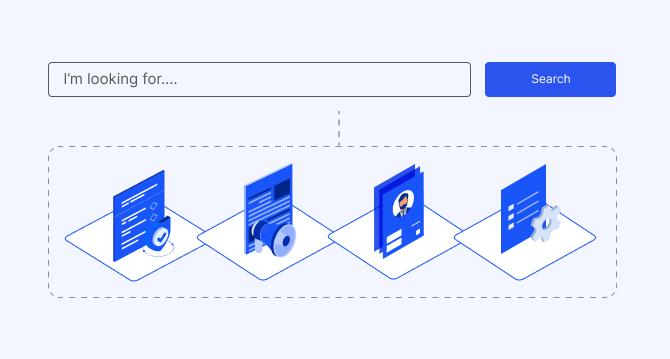
A guide to intranet search engine
Effective intranet search is a cornerstone of the modern digital workplace, enabling employees to find trusted information quickly and work with greater confidence.
Enterprise knowledge management guide
Enterprise knowledge management enables organizations to capture, organize, and activate knowledge across systems, teams, and workflows—ensuring the right information reaches the right people at the right time.
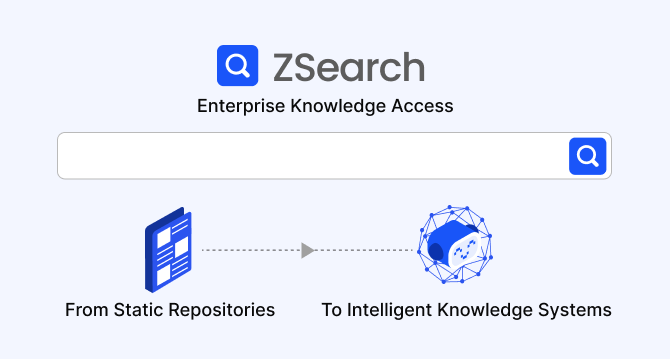
Company knowledge base: Why it matters and how it is evolving
A centralized company knowledge base is no longer a “nice-to-have” – it’s essential infrastructure. A knowledge base serves as a single source of truth: a unified repository where documentation, FAQs, manuals, project notes, institutional knowledge, and expert insights can reside and be easily accessed.
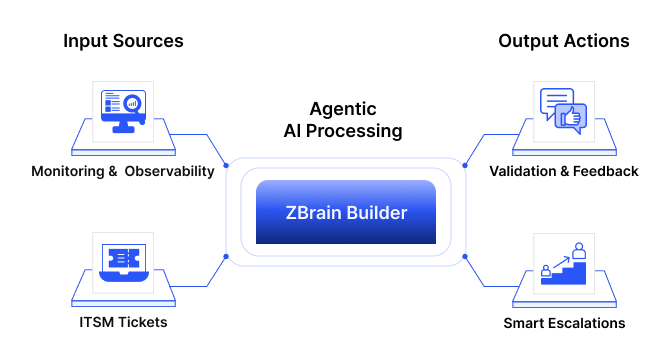
How agentic AI and intelligent ITSM are redefining IT operations management
Agentic AI marks the next major evolution in enterprise automation, moving beyond systems that merely respond to commands toward AI that can perceive, reason, act and improve autonomously.
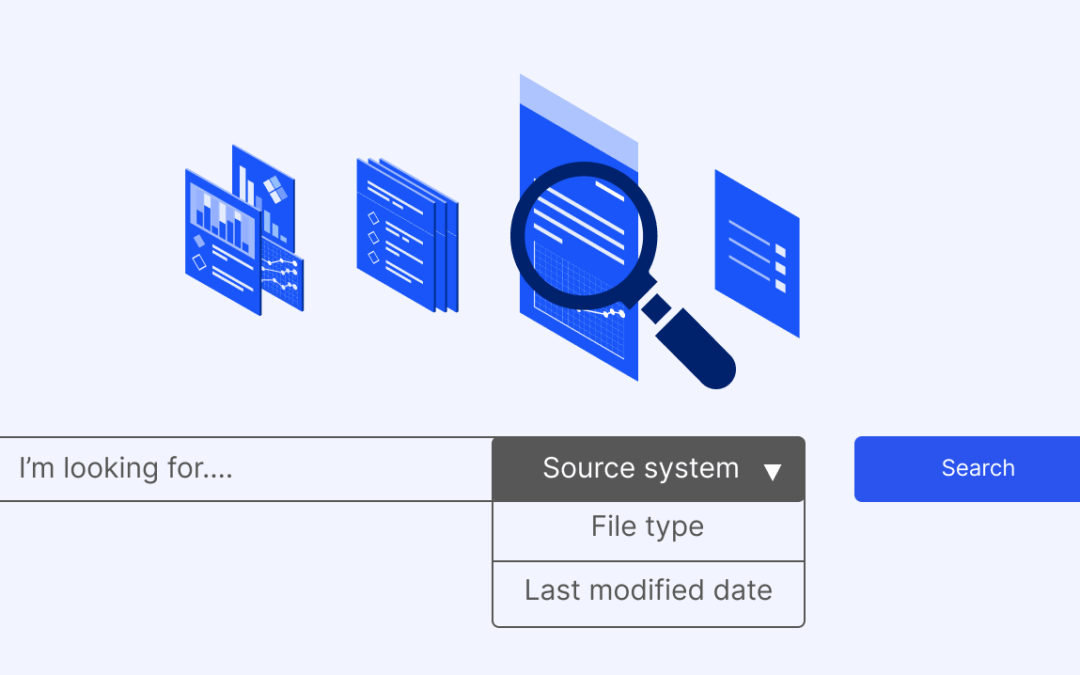
What is an enterprise search engine? A guide to AI-powered information access
An enterprise search engine is a specialized software that enables users to securely search and retrieve information from across an organization’s internal data sources and systems.
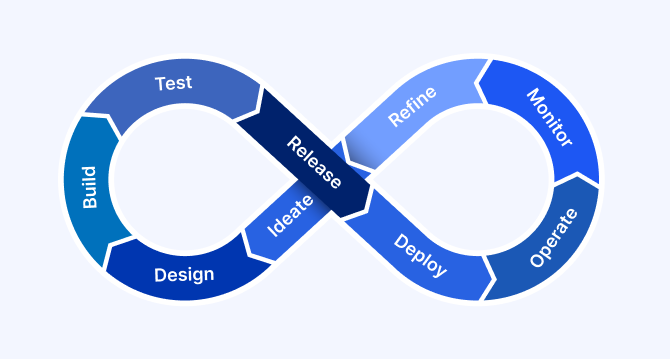
A comprehensive guide to AgentOps: Scope, core practices, key challenges, trends, and ZBrain implementation
AgentOps (agent operations) is the emerging discipline that defines how organizations build, observe and manage the lifecycle of autonomous AI agents.
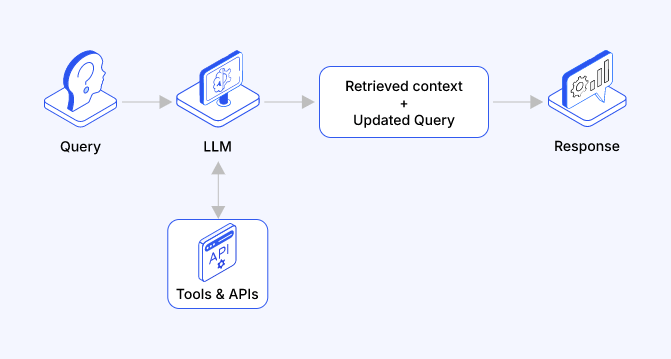
Adaptive RAG in ZBrain: Architecting intelligent, context-aware retrieval for enterprise AI
Adaptive Retrieval-Augmented Generation refers to a class of techniques and systems that dynamically decide whether or not to retrieve external information for a given query.
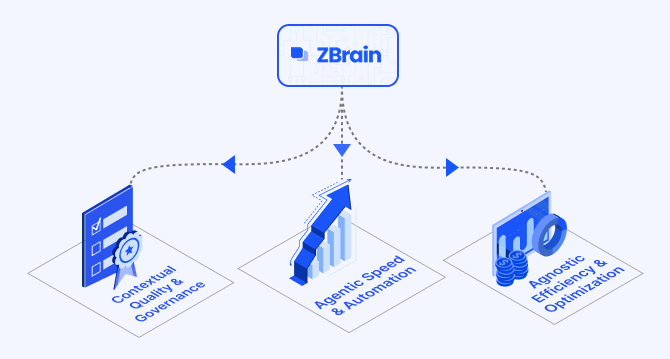
How ZBrain breaks the trade-offs in the AI iron triangle
ZBrain’s architecture directly challenges the conventional AI trade-off model—the notion that enhancing one aspect inevitably compromises another.
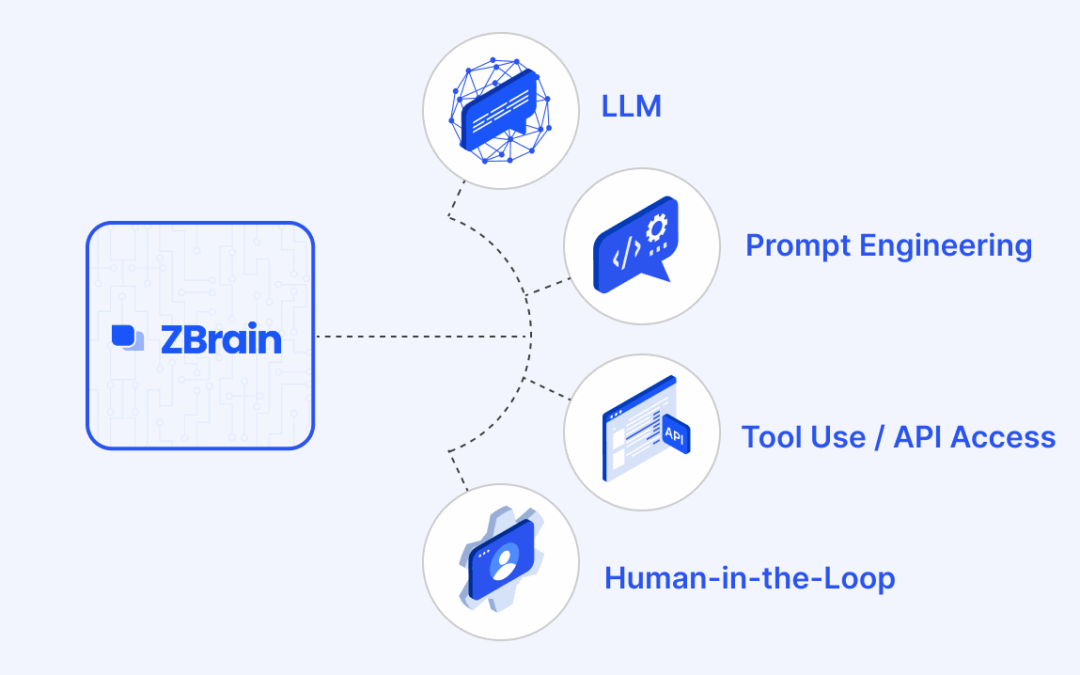
ZBrain Builder’s AI adaptive stack: Built to evolve intelligent systems with accuracy and scale
ZBrain Builder’s AI adaptive stack provides the foundation for a modular, intelligent infrastructure that empowers enterprises to evolve, integrate, and scale AI with confidence.



